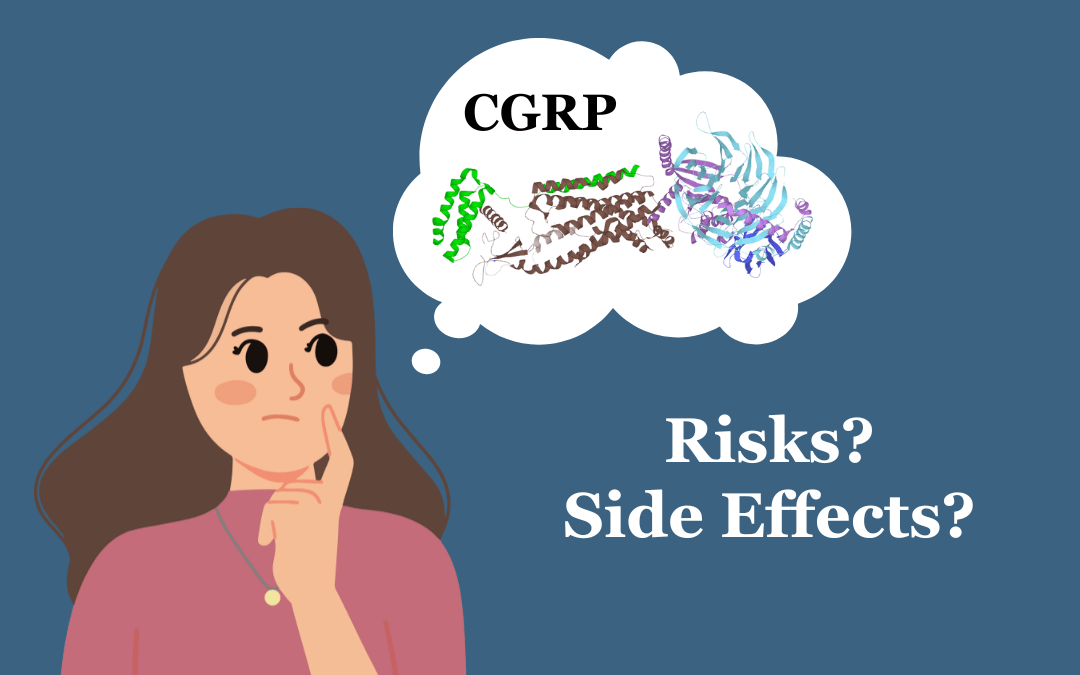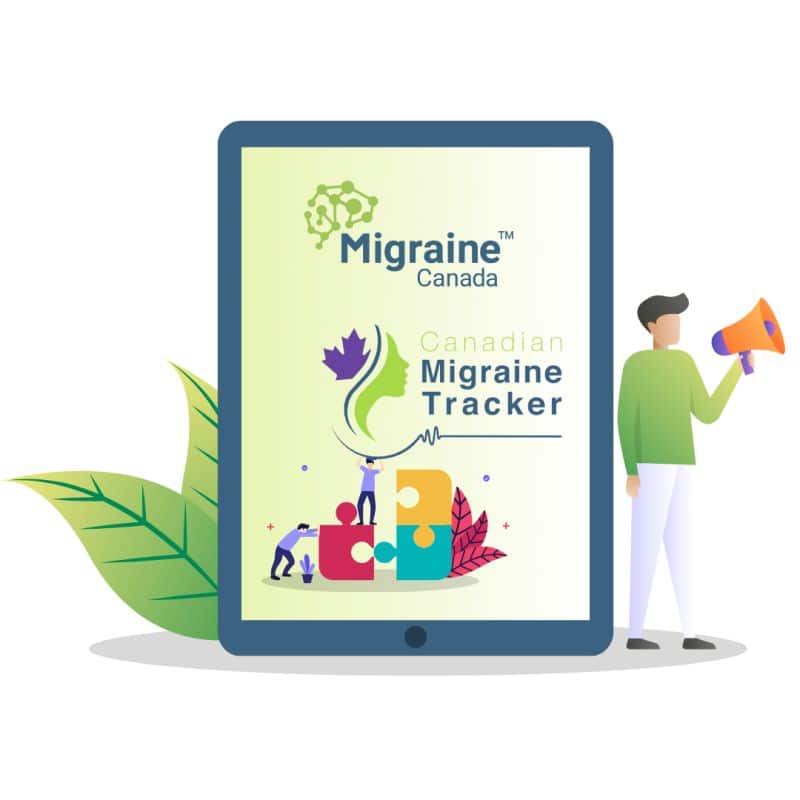Understanding the risks and side effects of CGRP monoclonal antibodies (MABs) is crucial for those considering these treatments for migraine prevention. In this detailed overview, we discuss potential contraindications, common side effects, and important considerations for using CGRP MABs.
Are there medical contraindications to CGRP MABs?
This topic should be discussed with your treating healthcare provider. In theory, there are no formal contra-indications in the drug monograph labels (the official prescription information provided by FDA and Health Canada).
CGRP MAB should not be used during pregnancy and should be stopped approximately 6 months before trying to conceive. See more below.
Still, specialists will use caution in certain situations.
CGRP does play a role in the vascular system and caution has been advised for people with vascular disease (heart disease, stroke etc). People with active vascular disease were excluded from the studies.
In the U.S., a warning label was added to Aimovig that it could cause new or worsening high blood pressure. Health Canada did not feel that there was adequate data to add this label in Canada. A recent published study that looked at the effects of Erenumab (Aimovig) on cardiovascular risk after 5 years did not find any additional risk for those on this medication.
There have been some case reports of worsening Raynaud’s with CGRP monoclonal antibodies. We know that CGRP is a vasodilator, and Raynaud’s involved constriction of the blood vessels in the hands and/or feet. If CGRP is blocked then it may reduce the body’s ability to effectively dilate those small blood vessels. Talk to your healthcare provider about this.
What are the main side effects of the CGRP MABs?
The following have been reported in clinical studies:
- Injection pain and minor reactions at the site of injection.
- Constipation
- Muscle and joint pains
Other side effects reported in the “real life” of headache clinics include:
- Fatigue
- Hair loss
- Increase in headache
- And others in a less certain association: dizziness, weight changes, brain fog, mood changes, etc.
What about constipation, is it common?
In the studies it was not common (<5%), but in real life and in specialty clinics it is reported in up to 1/4 patients (25%). Some severe cases of constipation have been reported (5/10,000, a low risk).
The risk is likely to be higher in people who have a history of constipation, are taking drugs that can be constipating (e.g. opioids, amitriptyline), or those who are impacted from bowel disease.
Most people can manage by drinking more water, increasing fiber intake, taking laxatives or magnesium (which is also good for migraine). Reports from headache clinics are that constipation is rarely severe enough to stop the medication if it is effective.
Are there allergic reactions to CGRP MABs?
Yes. Allergic reactions (including anaphylactic shock and different skin rashes) have been reported but are rare. Do not hesitate to seek medical advice if you have a reaction and report it to your treating healthcare provider.
Will the CGRP antibodies influence my immune system?
It makes sense to associate antibodies with the immune system, but antibodies used as treatments influence only the specific system that they target. We do not have evidence that CGRP MABs decrease immunity or make people vulnerable to infections.
I have seen reports of severe side effects on social media. Should I be concerned?
People on social media are reporting effects like insomnia, mood disorders, weight gain that have not been seen in the studies. The studies on CGRP MABs suggest a good tolerability. It does not mean that an individual cannot have a particular side effect!
Social media offers great opportunities for sharing but remember that they may overrepresent negative experiences. Also, reading about side effects may modify your expectations and produce a nocebo effect. Discuss this with your healthcare provider. If you have a side effect, do report it. Experience will grow and we’ll have more information with time.
Which MAB is the best tolerated?
This will probably vary from one person to the other. Overall, CGRP MABs are very well tolerated, probably better than oral preventives like Topamax (topiramate) and Elavil (amitriptyline). Some patients do report significant side effects. CGRP MABs are relatively new medications. Observation in the long term will help us to build our experience.
If I take a MAB for years, should I be aware of any risk?
Up until now, we have the following data on the long term:
We don’t yet know about risks associated with 10 year use. The role of CGRP on the vascular system has raised questions in the scientific community, but so far no alarm signal is seen. Scientific observations and registries are the best way to gather this important information.
How does my body clear the antibodies? Is it with the liver or the kidneys?
MABs are not metabolized by the liver or kidneys. That’s a good thing, because they can be used by people who have liver and kidney problems (always after a medical discussion of course). MABs are cleared by the system that manages our own antibodies, called the reticulo-endothelial system. They might stay in your system for 3-4 months after you stop them, with the amount decreasing progressively.
What about wearing off at the end of the month? I have seen this online
The wearing off (headaches coming back at the end of the month) has been observed, but it is not a common problem (probably less than 5-10% of people). In theory the MAB levels in the body should remain stable, but individuals are different and some people may metabolize MABs faster. A headache diary is key. More research needed!
Can CGRP MABs be used for kids and teens with migraine?
No. At present time these medications are for adults only. Studies are underway. There is not enough research on children and teens! Some headache experts may decide to try CGRP MABs for teens, but this is decided on a case by case basis and would be “off-label”.
Can I use a MAB if I am over 60 years old?
- Label in Canada for Aimovig: up to 65 years old
- Label in Canada for Emgality: up to 65 years old. In one study, Emgality has been used by people up to 75 years old.
- Label in Canada for Ajovy: up to 65 years old.
- Label in Canada for Vyepti: up to 65 years old.
Can I use CGRP MABs if I am pregnant?
No. CGRP plays a role during pregnancy and it is not safe to use these treatments if you are pregnant. If you are planning a pregnancy, you should discuss this with your doctor. Antibodies remain in the body for months and should be stopped well in advance (approximately 5+ months before becoming pregnant).
Can I use CGRP MABs if I am breastfeeding?
Probably not as there is not enough evidence to rule out infant risk. MABs are immunoglobulins, and these go in the maternal milk to be digested by the baby. It is safer to avoid.
Do the CGRP MABs interact with the birth control pill?
No. This has been studied and there is no interaction.
Can I combine CGRP MABs with my other migraine preventives and acute medications?
Usually, yes, you can. Antibodies usually do not interact with medications and since they do not influence the liver and the kidney they also do not change the way medications are metabolized in your body. Of course, discuss with your physician.
For additional information on CGRP antibodies, please refer to these resources:
- Our post on CGRP Monoclonal Antibodies: Summary and Effectiveness
- Our post on CGRP Monoclonal Antibodies: Access and Coverage
- Watch our webinar on CGRP Monoclonal Antibodies Part 1 and Part 2 for an in-depth discussion on how these treatments work and their impact on migraine prevention.
- CGRP-Blocking Antibodies: Q&A With Dr. David Dodick
- What to Know About the New Anti CGRP Migraine Treatment Options
References
- Tepper SJ. History and Review of anti-Calcitonin Gene-Related Peptide (CGRP) Therapies: From Translational Research to Treatment. Headache. 2018;58 Suppl 3:238-75.
- Pavelic AR, Wöber C, Riederer F, Zebenholzer K. Monoclonal Antibodies against Calcitonin Gene-Related Peptide for Migraine Prophylaxis: A Systematic Review of Real-World Data. Cells. 2022;12(1).
- Messina R, Huessler EM, Puledda F, Haghdoost F, Lebedeva ER, Diener HC. Safety and tolerability of monoclonal antibodies targeting the CGRP pathway and gepants in migraine prevention: A systematic review and network meta-analysis. Cephalalgia. 2023;43(3):3331024231152169.
Post #913



